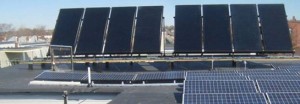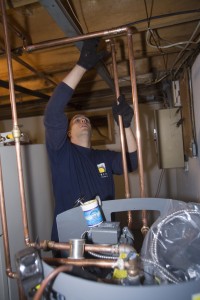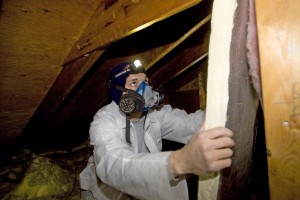 Through November, Cambridge Energy Alliance is offering Cambridge businesses and residents up to $2000 to install solar hot water heaters. The CEA Solar Hot Water Grant combined with the state and federal incentives, will allow you to install a new 20-year hot water heating system for up to 75% off. Average systems that are normally about $8,000 will cost less than $2000 in out-of-pocket costs.
Through November, Cambridge Energy Alliance is offering Cambridge businesses and residents up to $2000 to install solar hot water heaters. The CEA Solar Hot Water Grant combined with the state and federal incentives, will allow you to install a new 20-year hot water heating system for up to 75% off. Average systems that are normally about $8,000 will cost less than $2000 in out-of-pocket costs.
Cambridge resident Ken Bader installed a solar hot water system a few weeks ago, saying “the grants and tax credits made this deal a no-brainer! I’m looking forward to paying (almost) nothing to heat my water.” Since his solar system allowed him to eliminate his hot water heating tank entirely he’s looking forward to the added benefit of “not having to buy a new water heater every six or seven years.”
With only three and a half months remaining the Cambridge Energy Alliance is urging any business, non-profit, or resident that is considering solar to install a solar hot water system now, while generous grant money is available. Many people will also qualify for a 0% interest rate HEAT loan, meaning they can put in a system with no upfront cash needed.
Claudia Majetich, of Concord Avenue is pleased with the solar hot water rebate, saying “The Cambridge rebate program for solar hot water is a wonderful help to home owners who need to replace their hot water systems. It makes our installation costs very affordable–just about the same as a new gas or oil system. And that doesn’t even include the savings I’m anticipating from reduced oil usage. Staff at the Cambridge Energy Alliance returned my calls right away, and provided lots of helpful information. Great program, Cambridge!”
Residents are not the only ones who can benefit. Businesses like gyms, laundromats, restaurants, and hair salons are excellent solar hot water candidates. Solar hot water installer Eric Lorenz of S&H Construction points out that “business owners investing in solar hot water systems can realize a 20-50 percent savings in monthly fuel costs, expand their marketing opportunities to reach new audiences and simply enjoy the fact that they are harvesting the sun’s energy for use in their day-to-day operations. Installing solar guarantees a positive return on investment and with current incentives in place today, the returns are the best they have ever been.”
To get started, contact a local solar hot water installer and apply for the Massachusetts Clean Energy Center (MassCEC) rebate. After receiving the MassCEC rebate, Cambridge residents, businesses and non-profits can apply for the non-competitive CEA Solar Hot Water Grant. The CEA Solar Hot Water Grant will reimburse system owners up to $2,000 for out-of-pocket costs after all other rebates and incentives have been calculated.
Solar hot water systems provide an easy and low cost way to make hot water sustainably. Solar hot water systems heat water for laundry, bathing and even space heating. Anyone with heating oil can expect a short 5-year payback on the investment. A solar hot water system generally works in conjunction with your existing hot water heater or utility incentives can be used to replace old systems with new, super efficient hot water heaters and boilers installed in combination with solar hot water systems.
Solar hot water systems generate heat from sunlight to make hot water. Roof mounted solar ‘collectors’ for hot water systems look very similar to solar photovoltaic (PV) panels, which generate electricity rather than hot water. A solar hot water system can be connected to a building or home’s existing hot water tank to heat water. Some solar hot water systems can also connect with the heating system to provide space heating. Because about 20 percent of the energy a consumer uses at home goes to heating hot water, solar hot water systems can generate significant savings by decreasing the amount of gas, oil or electricity used to heat the water.
To find out more about solar hot water, see the MassCEC Solar Hot Water Fact Sheet.
The Cambridge Energy Alliance grant will amount to approximately $2,000 for a typical solar hot water system for a four to five person household, in addition to the approximately $1,000 in MassCEC rebates. Combined with other federal, state, and utility incentive programs, the total rebate can cover more than half of the cost of a system. Cambridge Energy Alliance’s Solar Hot Water grant is funded with $40,000 from the federal Energy Efficiency Conservation Block Grant.
Get started by calling a local Solar Hot Water installer to begin MassCEC’s Commonwealth Solar Hot Water rebate application.
Applications for the CEA Solar Hot Water Grant must be received by November 19, 2012. CEA Solar Hot Water Grants cannot be processed until you complete the MassCEC Commonwealth Solar Hot Water application process.
Solar rebate programs have helped spur a vibrant solar industry in Massachusetts. According to a MassCEC survey of clean energy companies, employment in solar manufacturing, installation, and services has increased nearly three times since Governor Patrick first took office, and solar manufacturing jobs alone have close to tripled from 2007 to 2010.




 Rooftop gardens, or green roofs, are popping up everywhere. These gardens add life and color to gloomy, industrial looking cities and drab roofs.
Rooftop gardens, or green roofs, are popping up everywhere. These gardens add life and color to gloomy, industrial looking cities and drab roofs.